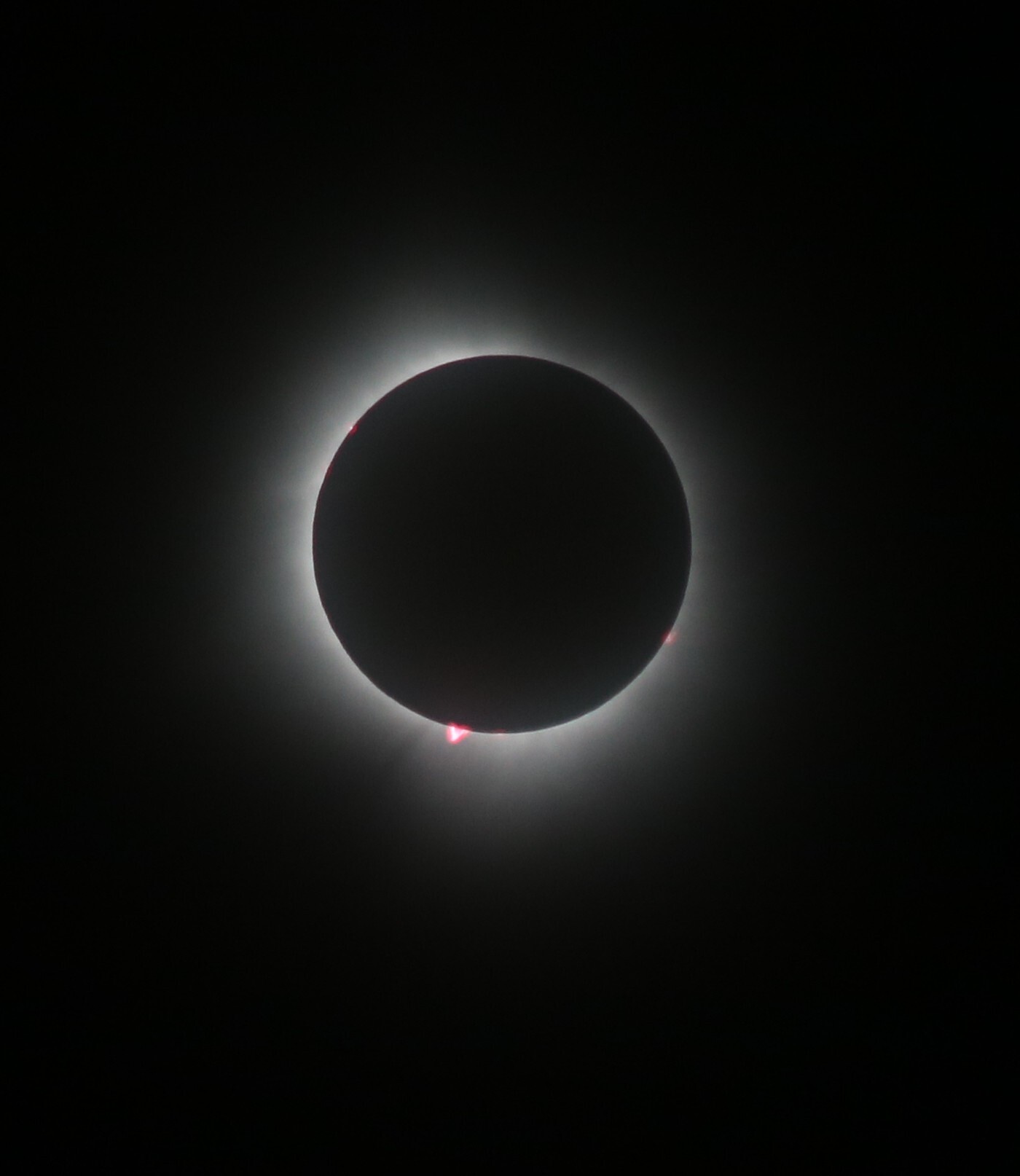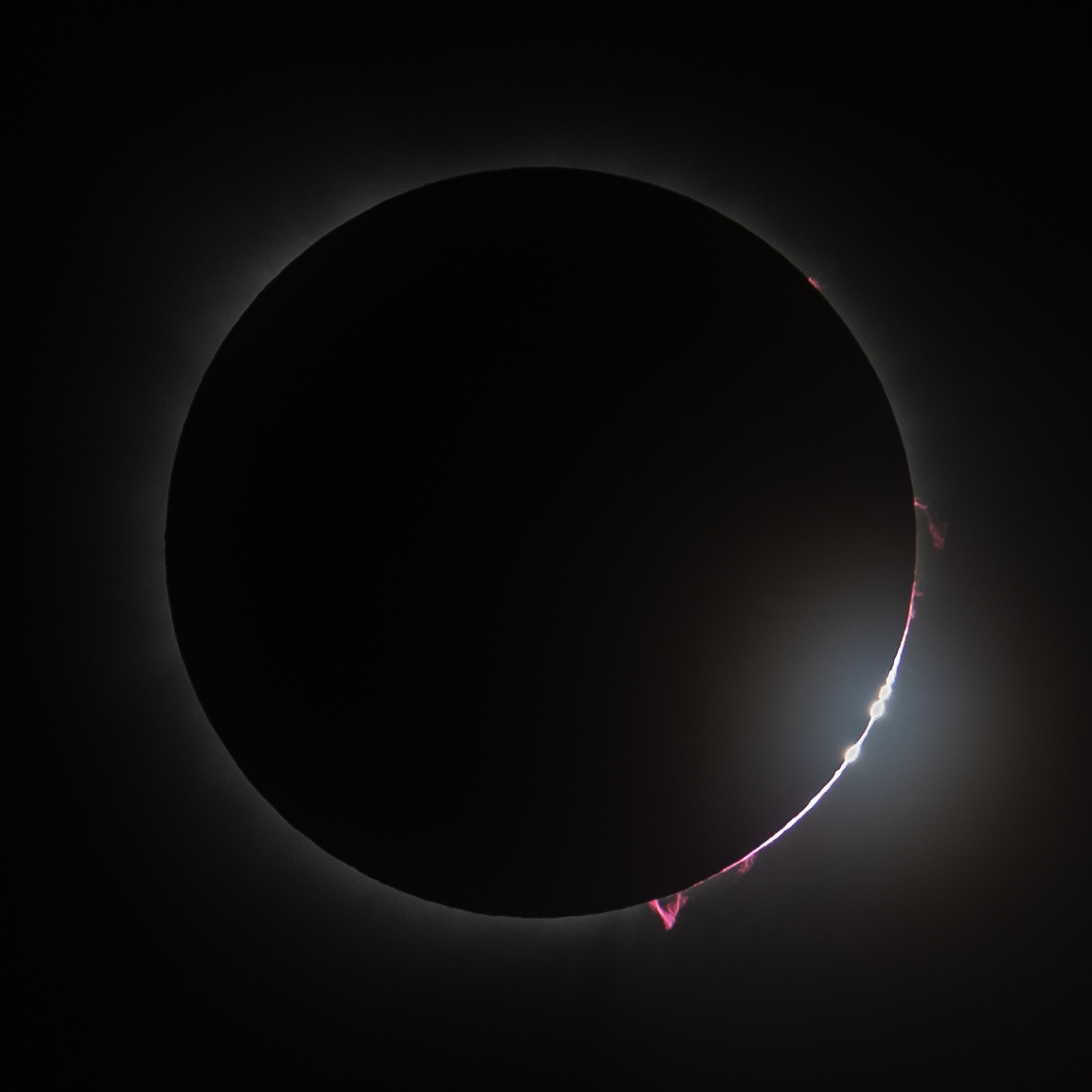We can see solar flares!!!!!!!! How cool is that???
The pillars and loops are prominences that result from the ionized solar material following magnetic field lines on the surface. Flares are explosions that occur when those magnetic field lines break and reconnect. So, flares are often seen where prominences are occurring, but they're not the same phenomenon.
Yeah it was crazy, we could all see a red dot with our bare eyes during totality and weren't sure what it was. Think it might've been a particularly bright solar flare!
Like this photo isn't even specially edited. I literally just brought down the highlights to get better definition on the beads because without that it looked more like the diamond ring. No artificial color enhancement or anything.
The most prominent red dot visible during totality was the big loop prominence that you have at 5 o'clock in your image here. On Monday night, I compared my pre-totality images with those from the Solar Dynamics Observatory, and was able to use the sunspot clusters to match their orientation. The brightest of the red dots was right where the loop is.
That's awesome! Thanks for the clarification between flares and prominences as well!
Absolutely stunning picture. The beads are beautiful, and the prominences are stunning.
Also from VT. We were wondering what the red spots we were seeing near the 5 o’clock position were. I had guessed they were flares, thanks for confirming.
For those that missed it, the flares & prominence were visible to the naked eye as red dots.
I read an article today in which they said that those were not flares but prominences. Equally neat, if you ask me. Each one of those spots was about 10 earths big, which is wild!!
I got a similar photo, but not with a reflector. My image is the reverse of yours. :-)
I missed the correct exposure during C2, but was able to get it around C3 as totality ended. Maybe that's why it's the reverse. I wasn't using a reflector though, not sure where/how that'd be used.
I suspect they're saying a reflector telescope, or other telescope arrangement, that flips the image. I'm also a bit confused because while I also immediately assumed you had a flipped image, others are agreeing it was a 5 o'clock dot. My images (with a standard camera and lens) and memory (eyeballs and binoculars) put the dot at the 7. My post-totality beads are also to the left rather than right.
But still, your image is amazingly crisp. I jealous I spent time making fuzzier images. Best one I've seen here yet, short of observatory equipment. I had a crop dslr with a 70-200 f/4
Honestly I remember it being at 7 o'clock too but I think it might've just been that my camera was rotated a bit weird because it was mounted to a star tracker. I was really happy with how crisp it came out. I used a longer lens (this photo was at 400mm) and also made sure to use f8 as that's been noted to be the sharpest aperture for my lens. Beyond that I had focused on the sun using the sun spots and then didn't change the focus at all. I also had a remote trigger so I wouldn't shake the camera while taking the image. Also for this image I brought down the highlights which helped cut down on the blooming around the brightest features and helped them look more defined. I am very happy I was able to get this result because this was the first time I've tried shooting an eclipse and really wasn't sure if I was doing it right.
Interesting. I was wondering if mine was rotated on the eq mount but then I remember all the menus were right side up lol. I was also in VT, just south of Burlington. We're you north of there? I suppose we all saw the beads at different points depending on how far south or north from the centerline we were. It's weird to think about how a tangible distance on earth can make a noticeable affect on celestial objects. And I guess these prominences were so "small" that the exact ones you saw changed throughout the 3.5 minutes. If you weren't north... I don't know then. But, alas, I submit my best shot from totality and the best version of the beads I got from the end. Maybe I was rotated too with my rotating screen and remote shutter. So here's why I'm so impressed with your shot and disappointed I didn't even ask to borrow a 300-600 from a birder who stayed home!


I was like 30-40 min north of Burlington so maybe that is what made the difference? And those shots look awesome dude! I get the beads came out a little fuzzy but the totality shot looks great! Especially for being at 200mm. You could always use this at motivation to start planning a Spain trip for the one in 2 years haha
Thank you. I think next time, I might just watch with binoculars and record video with a cell phone for the affect on the area. Unless I manage to get a significantly better lens/telescope. But I'll probably get the itch anyway, knowing from this post that everyone sees different beads
Yeah actually just looking around the way the light changed and that weird darkness with light all around you in the distance was really cool
The orientation of the sun and moon relative to the horizon actually depend on your latitude. Think of it in the extremes: Teo peoplee standing on the North and South Poles see the sky upside down relative to each other.
That makes sense. However, both of us identified the same city and everyone at this event was in the same hemisphere. So all the same moon orientation, but the approach/departure angles were entirely different across just a narrow band. 100 miles or something.
Love the meeting of the minds here, thanks for the background. Stunning image, more stunning because I learned!
Holy cow, amazing job! I want this as a wallpaper, do you have a higher res photo?
I don't have a higher res version (this was a crop from the full image that had a lot of blank sky) but if you want, I can run it through the Lightroom ai super resolution thing to make a higher res version for wallpaper. What ratio do you need? 16:10 or 16:9?
Ah, understandable. 16:9 would be great!
This is the best I could do.

Edit - does lemmy compress images? I may need to share the file elsewhere if that's the case...
That’s more than enough, thank you so much! The compression isn’t bad, it looks fine on my phone
Space
Share & discuss informative content on: Astrophysics, Cosmology, Space Exploration, Planetary Science and Astrobiology.
Rules
- Be respectful and inclusive.
- No harassment, hate speech, or trolling.
- Engage in constructive discussions.
- Share relevant content.
- Follow guidelines and moderators' instructions.
- Use appropriate language and tone.
- Report violations.
- Foster a continuous learning environment.
Picture of the Day
 The Busy Center of the Lagoon Nebula
The Busy Center of the Lagoon Nebula
Related Communities
🔭 Science
- !astronomy@mander.xyz
- !curiosityrover@lemmy.world
- !earthscience@mander.xyz
- !esa@feddit.nl
- !nasa@lemmy.world
- !perseverancerover@lemmy.world
- !physics@mander.xyz
- !space@beehaw.org
- !space@lemmy.world
🚀 Engineering
🌌 Art and Photography
Other Cool Links

